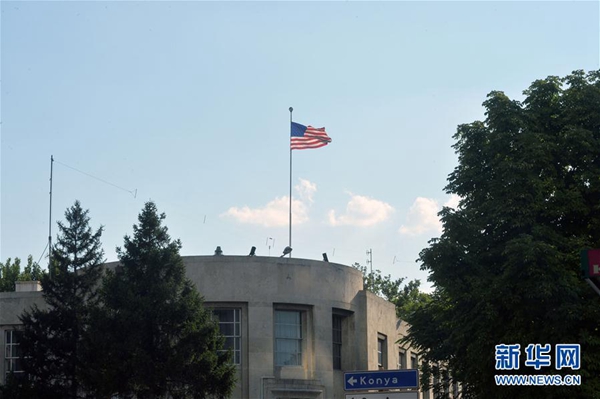Ankara-Washington tensions create new page of regional relations
- By Haifa Said
 0 Comment(s)
0 Comment(s) Print
Print E-mail China.org.cn, October 19, 2017
E-mail China.org.cn, October 19, 2017
 |
|
U.S. Embassy in Ankara [Xinhua] |
Mounting tensions between Turkey and the United States took a critical turn when President Recep Tayyip Erdogan refused to receive the American Ambassador John Bass before he left Ankara, following his appointment as ambassador to Kabul, holding him responsible for a visa issuance imbroglio.
Diplomatic sources saw it as a clear escalation on Ankara’s part after its tit-for-tat move to suspend non-immigrant visa services, mirroring a similar decision by Washington irritated by Turkey’s arrest of a local employee at its Consulate General in Istanbul.
Metin Topuz was arrested for alleged links to the Fethullah Gulen movement, dubbed as a terrorist organization by Ankara, as well as charges of espionage and attempting to overthrow the country's government.
Bilateral relations have been especially strained since September 21 when President Donald Trump rejected his Turkish counterpart's request to extradite Fethullah Gulen, now living in Pennsylvania, and hand over Turkish businessman Reza Zarrab, arrested in 2016 on charges of money laundering and helping Iran to bypass American sanctions against it, and who is also involved in corruption cases linked to Erdogan’s family.
However, the roots of the existing tensions date back to earlier discords in the course of the so-called "Arab Spring," when the U.S. and Erdogan, a supporter of Muslim Brotherhood in the region, first engaged in a political project to enforce comprehensive regime change and creation of a "Turkish model" of intermingled secularism and Islam.
Turkish-American relations had at first flourished after Barack Obama visited Turkey on his first presidential visit to a Muslim nation.
However, with the fall of the Muslim Brotherhood-advocate President Mohamed Morsi in Egypt and Obama’s backing of a military strike to overthrow the Assad regime in Syria over allegations of chemical weapons use, things changed.
Erdogan expressed disappointment with the West’s alleged "weakness" and inaction to implement Turkey’s idea of a buffer zone on its southern border with Syria.
American resentment mounted in 2014 when Erdogan rejected repeated calls to contribute to the international coalition’s operations against the ISIS terror group, only to reluctantly accept it in 2015, after being pressured by Washington’s wide military and political support for Syria Kurds, linked to those seeking separation of the east and southeastern areas in Turkey.
A major link in the chain of brewing tensions was the failed coup attempt in Turkey in July 2016, allegedly masterminded by Gulen but, according to Erdogan, with American involvement.
More recently, Ankara has accused Washington of giving the "green light" for the referendum on the creation of an independent Kurdistan in northern Iraq, posing a perceived immense security threat to Turkey.
It is against this backdrop that there have been signs of Turkey pivoting closer to Russia, one of its close trading partners, and Iran, its traditional regional rival, opening a troubling new page in political relations in the Middle East.
Russia’s intervention in Syria since 2015, at the expense of reduced American influence, has begun to have a cumulative effect on the nature of regional relations between the various conflicting parties in Syria and Iraq, forcing reluctant Turkey to work directly with Iran and Russia on the establishment of agreed de-escalation zones.
An Ankara-Tehran warming emerged in the summer of 2017 with both sides being targeted by Saudi Arabia and the UAE for siding with Qatar in the Gulf feud with Donald Trump’s blessing.
This rapprochement was also reinforced by Iran's rapid cooperation with Turkey in the summer of 2016 before and after the attempted coup. More urgently, the Kurdish independence vote accelerated discussions during Erdogan’s visit to Tehran on October 5, as both Ankara and Tehran fear a desire for independence by their Kurdish population.
Russian President Vladimir Putin’ visit to Turkey in September, which yielded a deal on supplying Ankara with the Russian S-400 missile defense systems, is a strong turnaround for two countries, which had backed the opposing sides in Syria and nearly clashed over Turkey’s downing of a Russian jet in 2015.
At such a crucial time, it would be optimistic to see a new phase emerging, shown by old opponents agreeing on rejection of the Kurdish secession amid an approaching political solution in Syria, in a promising step towards an alliance between Iraq, Iran, Turkey and Syria that could transform the region.
Haifa Said is chief editor of the English Department at the Syrian Arab News Agency.
Opinion articles reflect the views of their authors, not necessarily those of China.org.cn.






Go to Forum >>0 Comment(s)